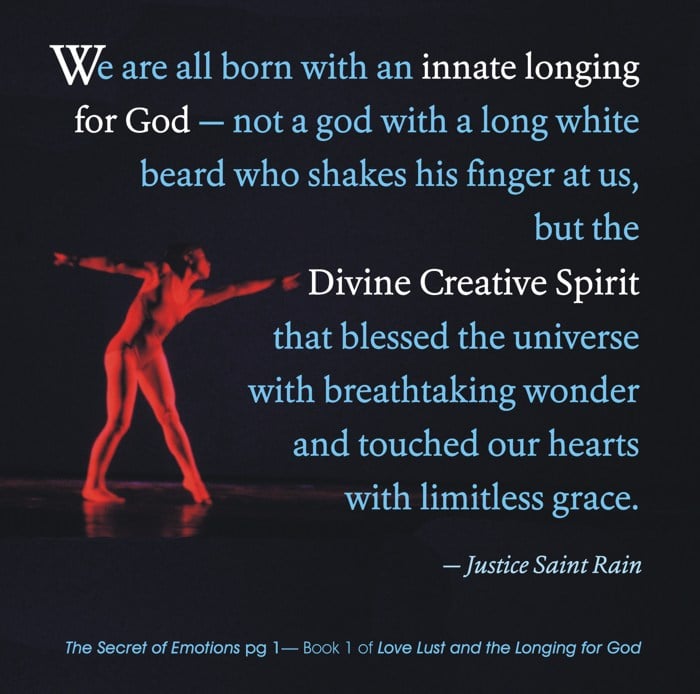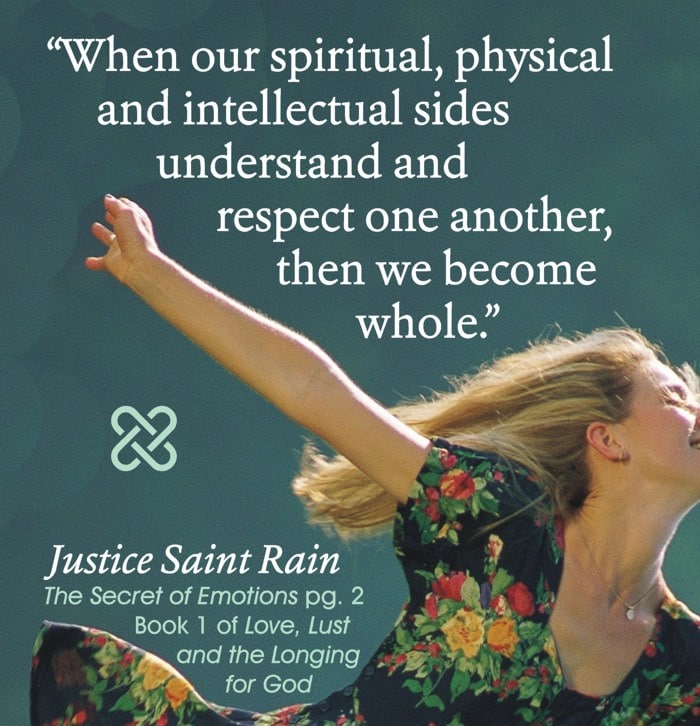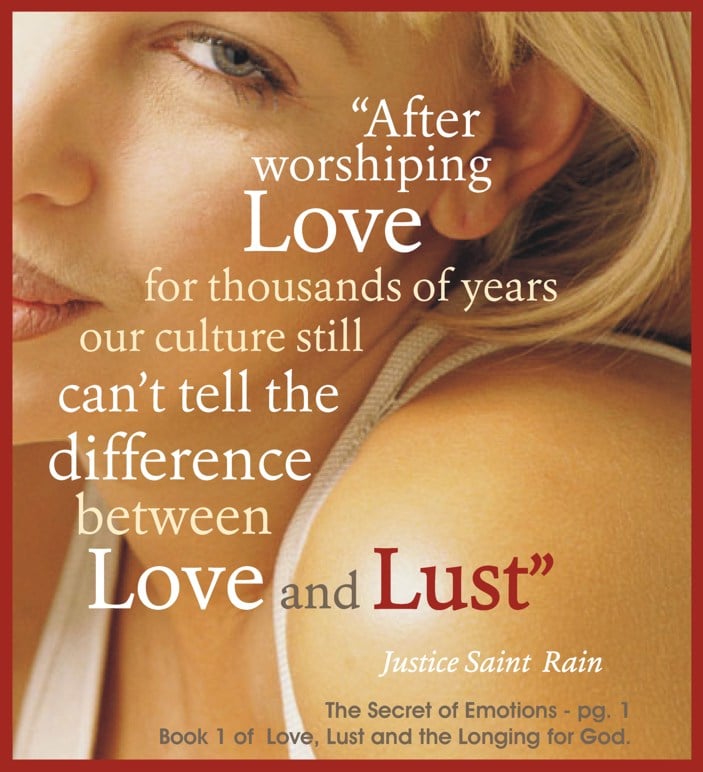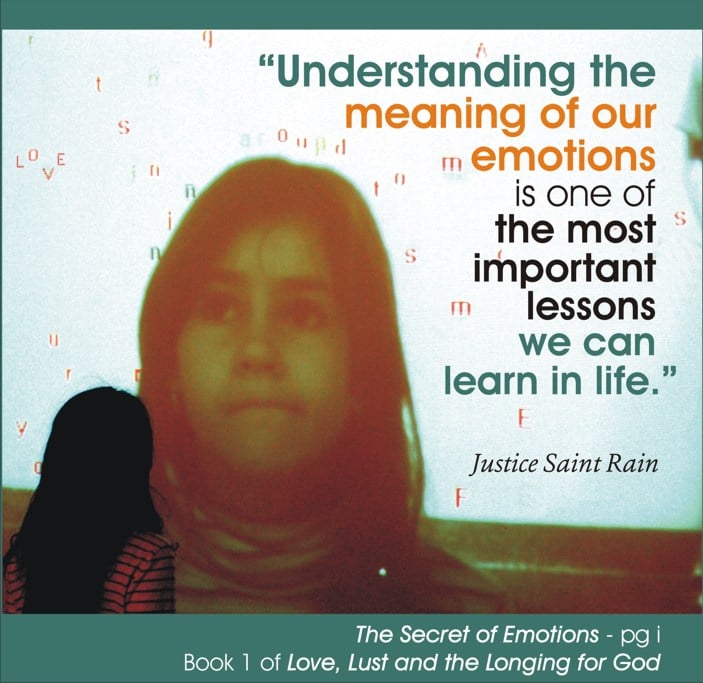
We are all born with an innate longing for God – not a god with a long white beard who shakes his finger at us, but the Divine Creative Spirit that blessed the universe with breathtaking wonder and touched our hearts with limitless grace.
This God filled His creation with His most noble attributes—and then placed the potential for each of these qualities within the human heart. Our longing for God is not an intellectual longing. It is a spiritual longing. We approach God, not through theological study, but by being attracted to the attributes of God that are both reflected in creation and placed within our hearts. It is these attributes, then, such as love, beauty, honesty, forgiveness, patience, creativity and compassion that are the source of our longing for God.
Of all of the attributes that we long for, the one that pulls at our hearts most strongly is love. It is the one we sing songs about; the one we organize our lives around; the one that we are absolutely sure will solve all of our problems.
One would think, then, that over the course of thousands of years we would all have come to a clear understanding of what love is, how it feels in our hearts, and how true spiritual love differs from its more material counterparts of lust and passion. Yet we have not.
Almost no one has.
Our inability to understand and accurately identify love causes many of us to do things in the name of love that are anything but loving; things that take us farther from our goals instead of nearer to them; things that make us feel ashamed instead of noble; things that convince us that we are failures instead of the radiant children of God that we are.
If we are ever going to satisfy our longing for love, and live the lives we were meant to live, then we will need to find a way to accurately identify spiritual love when we experience it so that we can create more of it in our lives.
This is the golden ring.
This is what we all want.
But it is bigger than that.
In order to learn how to recognize one of God’s attributes, we must develop the understanding and skills needed to recognize all of them. God is not a grab-bag of isolated gifts, like faith, hope and love that you get to pick and choose. God is One. If you want to tap into God’s love, you have to be prepared to accept all of God’s bounties, and if you want to be able to recognize and create one virtue, you will need to develop the skills to recognize and create them all – not all at once, but as a lifelong process.
That process, I believe, begins by getting our hearts, our minds and our bodies all speaking the same language so that what we want, what we feel and what we know all fit together accurately and are in harmony with one another.

When our spiritual, physical and intellectual sides understand and respect each other, then we become whole. We are no longer divided against ourselves. We become the pilots of our own lives rather than being buffeted by needs, wants and sensations that confuse us, sabotage our best intentions and lead us astray.
You see, none of us wants a series of dysfunctional relationships. We don’t want to destroy our marriages, sit alone in dark rooms watching videos, fantasize about people who will never love us, or do any of the other things that cause us shame. And yet if that is what we find in our lives, that must be what we are pursuing. Why is it, then, that we spend time and energy trying to acquire something that isn’t what we really want?
What is it that we are looking for when we walk into that bar, pick up that phone, log onto that website, smile at that stranger or knock on that door?
The answer is…
The answer ALWAYS is…
God.
We are looking for God manifested in the world of creation.
We are looking for love, kindness, meaning, security, joy, hope, nobility, connection, and a myriad other virtues that God deposited within the human heart when He made it His home.
But if that is what we are looking for…
Why can’t we find it?
The answer, if you think about it, is pretty obvious: Because we don’t know what these qualities look like, or, more accurately, we don’t know what these qualities FEEL like when we encounter them. How could we know how to accurately identify the signs of God’s virtues, when everyone out there is as confused as we are? We mistake kindness for weakness, hope for naïveté, nobility for stuffiness, and love… well love is the most misidentified virtue of all. We have been given wildly inaccurate and misleading information about this most important of virtues by everyone – from our families, schools, and religious communities, to almost every single movie and pop song ever made. The feelings we mistake for love range from need and lust to pity, fear and shame.
I can say this because at different times in my life, I’ve mistaken each of these sensations for love, and I don’t think I’m alone. If you have your doubts, let me describe a few experiences and see if they sound familiar. Then I’ll describe what I have come to believe love really is and how it really feels. But first, the mistakes:

My Rosetta Stone
This is the story of how I became painfully aware that I had absolutely no idea of what my emotional sensations were trying to tell me.
During my last year of college, I was dating someone pretty seriously. She was an absolutely wonderful woman – one with whom I might have been happy my entire life. We had talked about marriage, but this was several years before her graduation so we hadn’t become “officially” engaged or set a date.
One weekend, I went home to visit friends. While there, my best friend, who was married, told me about a wonderful single woman who had recently joined the community. He encouraged me to check her out before making any final commitments to my girlfriend.
I went to visit her, and had one of the strangest experiences of my entire life. Sitting in her room, my entire body began to tingle. I felt like I had electricity running through my veins. I remember that when she left the room for a minute, I paced back and forth, shaking my arms and fingers, trying to fling the excess energy out of my body. I was sure that if I touched her, sparks would fly between us.
Surely, this was a sign from God.
My heart was beating, my body tingled from head to toe; this must be what love was supposed to feel like.
Even though I knew almost nothing about this woman, I went back to my girlfriend and confessed that I would not be able to commit to getting married to her until I had explored this new relationship. She looked me in the eye and said, “Get out.”
So I moved back home to see if I could turn sparks and tingles into a permanent relationship. As you might guess, over the next few months the sparks and tingles began to fade, and when I was offered a job in a different city, our relationship died a natural death.
I was befuddled. What had it all been about?
Fast forward almost exactly ten years. I am divorced, broke, depressed, alone and horny. I find myself in the middle of the night, standing in the parking lot of an adult video store. As I contemplate whether or not to go in, my body starts to tingle. I feel like I have electricity running through my veins. I start shaking my arms and fingers, trying to fling some of that excess energy out of my body.
I stop.
I remember this feeling.
But now it sure doesn’t feel like love.
What was it all about?
I now had two data points for one sensation. What did they have in common? It wasn’t love. It wasn’t sex (I hadn’t been contemplating sex with the woman I had just met). So what were my heart and body trying to tell my short-circuited brain?
Finally, after much time, prayer, journaling and therapy, I figured it out.
This is what intense shame feels like.
I was ashamed of myself for being untrue to my girlfriend.
I was ashamed of myself for thinking of buying pornography.
My body had been trying to tell me to turn around and run, and what I heard was, “This is really, really important. Stay and explore it.”
If I could so completely misidentify a message of shame as a message of love, what other sensations had I misidentified over the years?
I began to listen, and watch, and correlate sensations with the experiences that went with them.
I discovered that when I got weak in the knees, it didn’t mean I was in love. It meant that I was afraid that I would be blamed for breaking someone’s heart.
I discovered that when my heart was moved by a woman’s tears, it wasn’t love, but a desire to rescue someone.
Over time, I began to identify sensations that were so subtle that I couldn’t put a name to them, I could only identify them by the patterns they followed.
A certain tug on my heart let me know that women had been sexually abused.
A similar tug said that they were afraid of men.
Another told me that they were recently divorced with small children at home.
An uneasiness that at one time might have felt exciting now tells me that someone is not being completely honest.
At one point, all of these little emotional cues – whispers of the heart – would have been interpreted as, “God wants me to explore a relationship with this person.” Now these messages simply say, “This person reflects some aspect of my relationship to my original God-figure. Resolve that relationship, don’t enter into this one.”

Next week: Recalibrating our inner compass so that we can accurately identify the emotions we are experiencing.
Click here to order the entire book, either in hard copy or Kindle.

